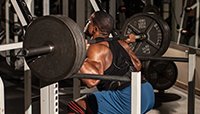Starting a fitness journey can be intimidating, especially if you're going in without any previous study. If you go to the Internet to find information, you might find yourself smack-dab in the middle of bad logic and bad ideas. It's difficult to sort out the fact from the fiction—especially when the fiction sounds so good.
That's where I come in! Check out these busted fitness myths so you can get started or continue moving down the right path. You'll find that with the right information, your fitness goals will become much more tangible than a speck of light in the distance.
Myth 1: If You're Heavy, You're Fat
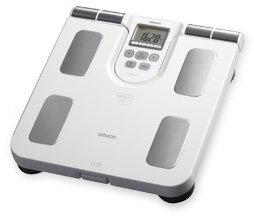
TRUTH: When you start weight training, it's natural to initially gain weight. Weight training stimulates the body to build lean muscle which will help to improve your metabolic rate. But this muscle also contains a large amount of water.
Weight training is also a source of inflammation, a well-known cause of water retention. After a week or two of weight training, you might jump on a scale and notice that you're heavier than when you started. Don't freak out. After a few weeks, your body will start to melt fat and your newly-acquired muscles will make you look leaner.
It's common to weigh more while your clothes fit looser. Muscle is denser and takes up less space than body fat. That's why a smaller, more muscular person may weigh more than a bigger person with more fat.
Myth 2: You Can't Build Muscle With Veggies
TRUTH: To build muscle, you need three consistent elements: stimulus from exercise, calories, and nutrients to support muscle building and recovery. Vegetables are filled with slow-digesting carbs, minerals, and vitamins. They're like grains, but with fewer calories. If you eat enough calories and sufficient, complete proteins, you'll gain muscle.
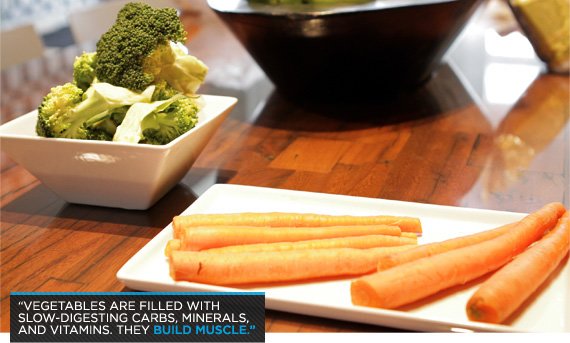
Overeating is anabolic in itself and that's why stuffing yourself all day is good for muscle. However, all that eating will also lead to unwanted fat gain. By eating vegetables as your carb source, you'll be able to stay leaner, feel fuller, and be healthier while you build muscle.
The only time this myth is actually real is when you fail to meet your caloric requirement. Without enough calories, you won't build muscle. Moreover, you can't hope to build muscle if you only eat vegetables. You need food that gives you complete proteins. So, if you're a vegetarian, combine those veggies with protein like nuts, dairy products, or soy and hemp protein.
Myth 3: You Have To Eat Fruit To Be Healthy
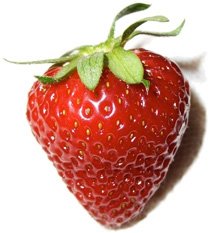
TRUTH: Vegetables have more minerals, vitamins, and even more anti-cancer properties than fruit. The difference between the two food groups is the calorie content. In general, vegetables have fewer calories than fruit. Also, fruit's sugar is mainly fructose, which is stored in the liver instead of in the muscles.
If you fill up on fruit, you're unlikely to eat as many servings of vegetables as you should. It's also true that filling yourself with high-calorie fruit means you won't achieve your fat-loss goal. I know people who eat apples and grapes every night, thinking they're helping themselves lose weight.
Myth 4: Women Tone, Men Build
TRUTH: Muscle is gained by stimulating muscle fibers to grow larger. We stimulate muscles by overloading them with resistance training. All bodies release growth hormone when they weight train, but men grow more muscle because they have more testosterone—a lot more. Men and women build muscle in the same way.
"Toning" and "building" are just different words to the same end: hypertrophy. Women use the word "tone" because they're afraid of "getting big." Most of the time, what they mean is that they want to see their muscles. So, most women want to be leaner with more muscle mass. In reality, most men want the same thing.
The typical rep range for muscle growth is 8-12 reps with limited rest time. The point is to exert your body and continuously add more weight during those sets. The longer your muscles are under tension, the better they'll respond to training.
Myth 5: If You Take A Long Break, Your Muscle Will Turn To Fat
TRUTH: Muscle is created by exposing your body to things that make it say, "Unless I get stronger and plump myself up, I will get killed!" When you stop training, you change the environment for your muscles. Suddenly, the need for them to hang around and be ready for battle will cease. Why keep something you don't need? Without constant tension, your muscle mass will atrophy and you'll burn fewer calories.
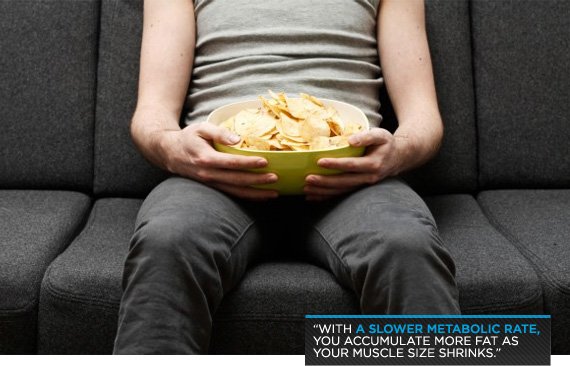
Most likely however, your appetite will stay the same and you'll suddenly find yourself eating way more calories than your body needs to maintain its weight. Muscle doesn't literally turn into fat, but with a slower metabolic rate, you'll accumulate more fat as your muscle size shrinks.
Myth 6: Salt Is Bad For You
TRUTH: Salt, just like all other minerals, is necessary for your health and your looks. If you're lean but never get a pumped or vascular look when you work, you're probably low on sodium. When your diet is lacking in salt, your body holds on to the little amount you give it.
When you finally increase your sodium level or eat a particularly salty meal, you'll retain water and feel bloated. Eat a normal amount of salt (1,000-2,000mgs) each day and your body will stop retaining sodium and will get better at releasing it. Eating a proper amount of salt will balance your electrolytes.
Myth 7: You Can't Be Ripped All Year
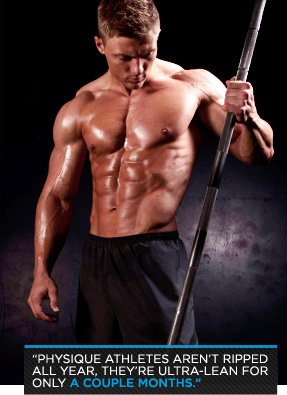
TRUTH: Ripped is a subjective state. But if by "ripped" you mean "visible striations and ultra-low body fat," you might have a hard time staying there, especially if you're a woman.
Women are supposed to have higher body fat, so a woman's body will fight her to keep it. To maintain an extreme condition, you'll need a disciplined diet and training program.
As a woman, staying ripped year round can have detrimental effects on your hormones. To assure optimal health, you must use strategies to replace what your body lacks. An unnaturally lean body will usually lack in sex hormones. That's just the way it works.
Most physique athletes are in great shape all the time, but they're ultra-lean for only a couple months out of the year.
Myth 8: Carbs Are Bad
TRUTH: If you want to gain muscle, you're going to need carbs. If you take them out completely, you'll burn more body fat during training perhaps, but you can't keep it up for long. Carbs are fuel for intense workouts, fats are not. Choose a macro plan that suits your athletic goals. If you're an athlete, you're going to need more than protein to make it through a game.
On a more serious note, you need a minimum amount of carbs to ensure that your brain functions properly. The brain needs glucose to work. Your body can be ketonic and use fatty acids to fuel your muscles, but your brain can't.
Myth 9: Weight Training Turns Women Into Men
TRUTH: If women aren't supposed to have muscles, why do we have them? The definition of "manly" differs from one individual to another, but we all have a different body structure. Some women have more feminine lines, others more androgynous. Wide hip bones and narrow shoulders are typical female shapes, but that doesn't mean an athletic woman is less feminine. Our society forms our ideals; you choose what you find attractive.

What makes athletic women bulky is more-than-average muscle mass combined with "excess" body fat. If you couple weight training with a smart diet, you'll be much smaller than you'd expect.
Myth 10: You Can Eat What You Want If You Train Hard And Take Fat Burners
TRUTH: To burn fat, you need to expend more calories than your body uses. Fat burners will increase your heart rate and aid in training performance, but it's not a magic pill. You can't hope to sit around and eat hamburgers all day and expect your fat burner to make you thinner. That's just silly.
Myth 11: If you want to lose fat, avoid fat
TRUTH: Fats are necessary to maintain healthy hormone levels and make use of vitamins. Without it, you'll create a terrible environment for muscle growth. Fats also help you regulate your appetite. A carb-and-protein-only diet can make any fat-loss or muscle-build goal almost impossible to reach.
Myth 12: Lots of calories make you fat
TRUTH: Chronically eating more calories than your body needs will make you gain weight. But you can gain both muscle and fat depending on where the calories are coming from and whether you stimulate your muscles into growth.
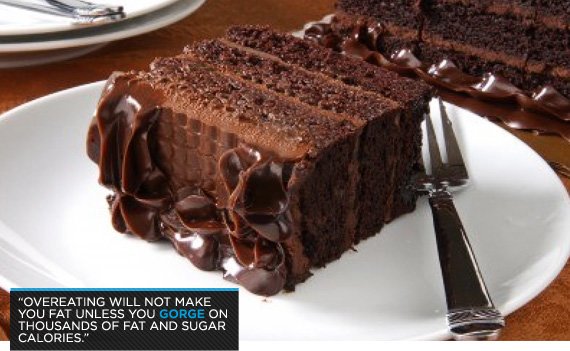
Occasional overeating will not make you fat unless you really gorge on thousands of fat and sugar calories and you're prone to gaining weight. When you increase your calories, you're at risk for gaining weight, but you're also speeding your metabolism.
Myth 13: Cheat meals are the same as re-feeds
TRUTH: A re-feed is a strategic increase of calories—usually carbs—that will boost your training intensity, replenish your muscle glycogen, and lead to further fat loss. A cheat meal, in my opinion, is a treat, and should only be used if you actually need it and have worked for it. It's a reward, not a sudden binge.
Myth 14: Natural/organic/gluten-free foods are best for
weight loss
TRUTH: No matter how "organic" your bread is, it still has calories. Yes, these foods may be healthier because they're more likely to be free of pesticides and other chemicals, but over eating "natural" food is still over eating.
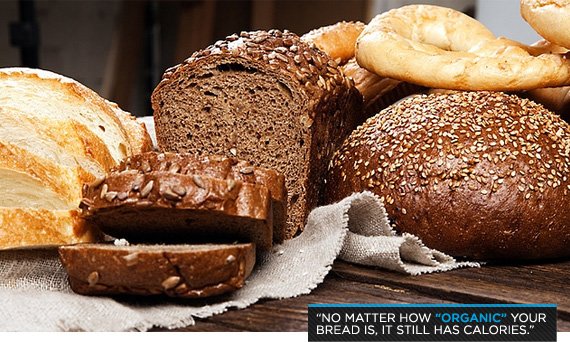
Myth 15: Carbonated drinks suck calcium out of your bones
TRUTH: This myth got its start because soft drinks contain phosphorus. High levels of phosphorus/phosphate have been linked to reduced bone mass and higher fracture risk.
The effect is probably due to people replacing dairy with soda, not the phosphorus itself. Furthermore, carbonation has not been linked to depleted calcium levels.
Myth 16: If you're a woman, don't work your upper body more than once per week. You'll look like a man
TRUTH: What? Once per week? Well, for bone health, you should definitely train your upper body. Without it, you'll be fragile. It will also look weird to have a buff lower-body (which in general, women already have), and sport a tiny upper body. Ever heard about the hunt for symmetry?
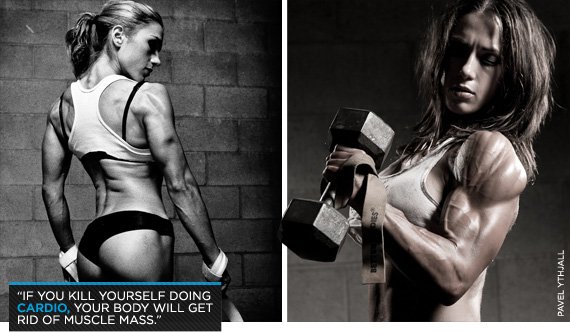
Myth 17: If you want to lose weight, do cardio until you drop the weight you want. Start lifting only after you've lost the weight
TRUTH: If you do that, you'll shed unnecessary muscle mass. More muscle helps your metabolism stay high. It's true that weight training doesn't burn a ton of calories, but the more lean mass you carry, the higher your all-day energy expenditure will be. Muscles require fuel all the time. If you kill yourself doing cardio, your body will get rid of muscle mass and it will be hard to lose fat at all.
Myth 18: Your metabolism slows down after age 30. After that, you're doomed to fat-hood. It's a woman's destiny
TRUTH: The reason metabolism slows down as we get older is a combination of lower hormone levels and less athletic activity. If you don't work out and eat healthy food, you'll get out of shape. Sadly, an untrained body is even more evident as you get older.
Myth 19: Women cannot gain muscle after age 50, so there's no point in lifting
TRUTH: You can build muscle at any age. As long as you're challenging your muscles and feeding them the proper nutrients, your body will respond. As you age, building muscle gets more challenging. But like anything else, if you do your best, you'll get good results.
Myth 20: Diet sodas make you fat



TRUTH: You can't gain fat from something you don't drink or eat. Diet sodas don't have calories because they don't have any nutrients.
It's wrong to blame diet sodas for weight gain. They might, however, cause bloating and stomach discomfort, but that's hardly the same as body fat.
Myth 21: Do crunches for a 6-pack
TRUTH: A flat belly comes from being lean. If you eat too much, your abs will remain trapped beneath a layer of body fat. Everybody is born with abdominal muscles. You just need to lose fat to make them pop.
Myth 22: One cheat day per week won't harm you. Eat, drink, and be merry!
TRUTH: This is only true for people who don't struggle with getting or staying lean. Alcohol inhibits fat burning while your liver is detoxifying you. Alcohol is also indirectly fattening because we all tend to eat the wrong things after we've been drinking.
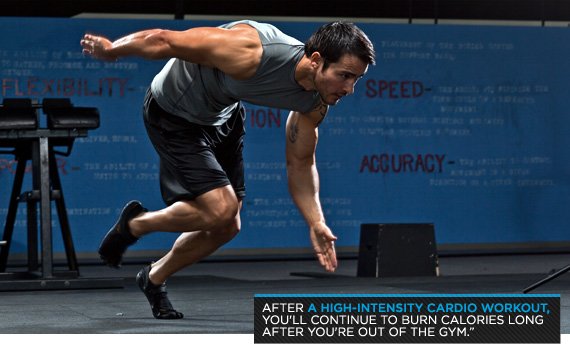
Myth 23: Stay in the fat-loss zone and you'll be ripped
TRUTH: The fat-loss zone was "created" when research showed the body burns calories at a higher percentage during low-intensity cardio workouts than high-intensity ones. However, this study didn't take into account the calories you burn after you work out.
After a high-intensity cardio workout, you'll continue to burn calories long after you're out of the gym. High intensity training usually works better. After all, losing weight comes down to expending more calories than you take in.
It's difficult to do high-intensity cardio every day. So if you need to do cardio each day, you'll need some variety. For more information, check out my best-selling ebook Cardio For Leanness.
Myth 24: If a product has no calories, I can have as much as I want
TRUTH: Zero-calorie syrups, jams, dressings, etc. aren't really no-cal. In our country, a product can advertise being no-cal if it has fewer than 5 calories per servings.
In reality, most of these products have about 5 calories per serving, so if you're going to down the whole bottle, you'll actually end up having more like 60 calories. Although that doesn't seem like much, adding 60 calories of meager nutrition to your diet won't do much to help you meet your goals.
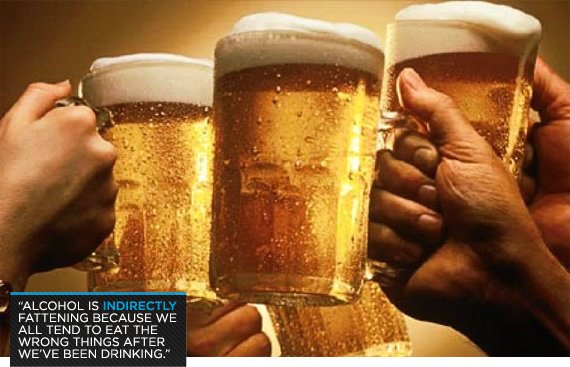
Myth 25: Healthy on the outside = healthy on the inside
TRUTH: That's called denial! Many symptoms, deficiencies, toxins and diseases are silent. They show nothing on the surface or don't have initial warning signs. You can never know if your organs are healthy or your bones are strong unless you do the right tests.

Recommended For You
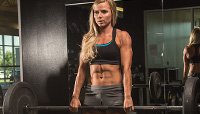
6 Common Myths And Misconceptions About Female Fitness Exposed!
Separate fact from the fiction when it comes to women's training and nutrition.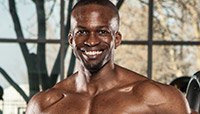
5 Muscle Misconceptions That May Stall Your Muscle Growth
Even if you're all about frying fat this time of year, sooner or later you're going to want to add size. Make sure you do it right.